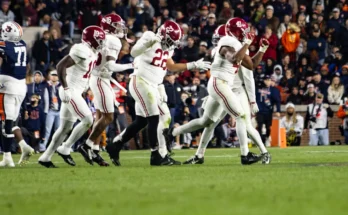Flau’Jae Johnson will hold off on signing a $2 billion WNBA contract because the allure of a huge NIL offer affects his selection choice.
Flau’Jae Johnson is making headlines again, but not solely for her electrifying performances on the basketball court. The LSU Tigers star guard, who has emerged as one of the brightest talents in college basketball, is now at the center of a major decision that could redefine the athlete-brand era in women’s sports. As speculation swirls around her WNBA draft eligibility and potential pro aspirations, Johnson is reportedly leaning toward staying in college—lured by lucrative NIL opportunities and the anticipation of an imminent financial transformation in the WNBA. With reports of a forthcoming $2 billion media rights deal for the WNBA, the stakes have never been higher for elite prospects weighing the timing of their transition to the professional level.
Johnson’s name carries weight not only because of her on-court excellence but also her remarkable presence off the court. A dual-sport dynamo with a flourishing rap career, massive social media following, and one of the most marketable personalities in college athletics, Flau’Jae represents a new breed of athlete—one as comfortable on TikTok or the mic as she is with a ball in her hands. Her NIL valuation has already placed her among the top earners in women’s college basketball, and staying another year at LSU could bring even more value as her brand continues to ascend.
What’s prompting this delay in heading to the WNBA is not just personal brand strategy—it’s financial foresight. The WNBA is reportedly in the final stages of negotiating a new media rights deal that could pour as much as $2 billion into the league’s infrastructure and operations. Such a deal would be groundbreaking for a league that has long fought for financial stability and mainstream exposure. For players like Johnson, that injection of capital could translate into increased salaries, better team resources, improved player conditions, and a broader commercial platform.
Currently, the maximum rookie salary in the WNBA is under $80,000, a figure that pales in comparison to what top-tier college athletes like Johnson can command via NIL endorsements. According to multiple sources, Johnson is believed to be earning mid-to-high six figures annually through a combination of music deals, endorsement contracts, brand sponsorships, and public appearances. Those deals not only match but often exceed the salary she would receive as a rookie in the WNBA—especially before the new media deal is implemented.
Johnson’s potential to benefit from both timelines—now through NIL and later via a more financially robust WNBA—makes her situation particularly unique. She has the rare luxury of waiting for the pro environment to catch up to her market value. And in doing so, she’s helping rewrite the traditional path from college to the professional ranks in women’s basketball.
The LSU program has played a crucial role in fostering Johnson’s brand. Under the leadership of Kim Mulkey, the Tigers have embraced the spotlight that NIL and social media bring. Johnson has leveraged the exposure gained from LSU’s deep tournament runs and high-profile games to build a fan base that extends far beyond Baton Rouge. Her style, charisma, and unapologetic personality resonate with young fans across the country, making her not just a college basketball star but a cultural icon in the making.
The recent reports surrounding the WNBA’s media rights negotiations further reinforce Johnson’s decision. The league is on the cusp of an evolution, one driven by record viewership, heightened sponsorship interest, and a new generation of marketable stars. A media rights package of $2 billion could significantly raise the salary cap, increase player salaries across the board, and provide teams with more resources to support player growth and welfare. Waiting for those changes to materialize could be the difference between earning $80,000 a year and several times that in the not-so-distant future.
While critics may argue that delaying a professional career comes with risks—injuries, changes in form, or missed opportunities—Johnson appears to be operating with a clear vision. She’s not just planning for the next season; she’s building a long-term empire. Her brand has room to grow, and LSU offers the perfect platform to do so. With the Tigers poised for another run at a national championship and Johnson at the center of their offense, the spotlight will only intensify.
Moreover, Johnson’s ambitions extend far beyond basketball. As an artist signed to Roc Nation, she is steadily building a parallel career in music that complements her athletic profile. Her music career, intertwined with her sports persona, presents rare crossover appeal that brands crave. The longer she remains in college, the more control she retains over both narratives, and the more leverage she has when it finally comes time to enter the WNBA—on her own terms.
Her decision also signals a broader shift in how elite women athletes are viewing their careers. The landscape has changed. Athletes no longer have to rush into professional leagues just for financial survival. The NIL era has empowered them to explore multiple income streams, develop personal brands, and make decisions rooted in long-term value rather than short-term necessity. Johnson is part of a wave that includes stars like Angel Reese, Caitlin Clark, and JuJu Watkins—players who are not only elevating the women’s game on the court but revolutionizing its business model off of it.
For the WNBA, Johnson’s decision might feel like a missed opportunity in the short term, but it could pay dividends down the line. When she eventually joins the league, she’ll bring with her an enormous built-in fan base, an established commercial profile, and the charisma to serve as a face of the league’s new era. By waiting for the media deal and the league’s structural upgrades, she’s setting herself up to enter a league that is more aligned with her value—and that’s a win for everyone involved.
Back in Baton Rouge, Johnson remains focused. Her message to fans is clear: she’s not just about flashy highlights and viral clips. She’s committed to growth, winning, and doing things the right way. The noise around her decision hasn’t distracted her; it’s sharpened her focus. With another season at LSU ahead, expectations will be sky-high—but if anyone has the poise to handle it, it’s Flau’Jae.
And for young athletes across the country, her story is a blueprint. It’s a lesson in patience, planning, and knowing your worth. It’s a case study in how to navigate the intersection of talent, timing, and opportunity. And when the time does come for Johnson to enter the WNBA, she won’t just be a rookie—she’ll be a brand, a business, and a leader ready to shape the future of the sport.
In an era defined by change, Flau’Jae Johnson is proving that the power truly belongs to the players. And by betting on herself, she’s about to win big—on and off the court.



